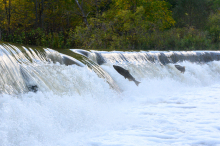
Landmark study finds low-sugar diet in early childhood reduces lifetime risk of chronic disease
A low-sugar diet in the first years of life can significantly reduce the risk of chronic diseases in adulthood, a study based on historical data has found.
The researchers pulled data from UK Biobank, focusing on adults conceived just before and after the 1953 end of wartime sugar rationing in the United Kingdom.

Tracking biodiversity: McGill researchers outline strengths and challenges in new monitoring framework
As the UN COP16 on biodiversity meets in Calì, Colombia, experts from McGill University are on-site, providing important input into the global conversation.

McGill aims to be a world leader in making dentistry sustainable
In response to growing concerns about climate change, McGill University researchers are exploring how even a routine dental visit can become a more sustainable practice
The Faculty of Dental Medicine and Oral Health Sciences is calculating the carbon footprint of its entire operation, including several clinics that serve the public. The goal is to become among the first fully sustainable dental faculties in the world.

Most Canadians consider public transit to be an essential service, according to initial results of a McGill study
Most Canadians view public transit as an essential service and support increased provincial funding in response to current financial difficulties, according to preliminary results from a McGill-led study.

How vitamin D deficiency can lead to autoimmune diseases
As Canadians brace for “vitamin D winter” – months when the sun’s angle is too low to produce the vitamin in the skin – a McGill University study explains why vitamin D deficiency early in life is associated with a higher risk of autoimmune diseases.

Genetic tweaks can make oats more nutritious, increase shelf life
A recent study from McGill University proposes a way to enhance the nutritional value of oats by increasing their content of oleic acid, a type of healthy fat known for its cardiovascular heart benefits and potential to lower diabetes.
The findings also suggest this modification could improve their oxidative stability, making oat-based products, such as oat milk, less likely to spoil.

Parenting programs help kids, but provide insufficient support for parents, study finds
Parenting programs that address both mental health and parenting skills can improve children’s development, but often fall short when it comes to offering effective mental-health support for parents, new research suggests.

New global database of dams and reservoirs could transform water management
A groundbreaking database developed by the Global Dam Watch (GDW) consortium is set to transform the global understanding of dams and reservoirs.
Co-ordinated and led by members of a research lab at McGill University, with funding from World Wildlife Fund (WWF) and the World Bank, the database integrates existing global datasets to provide the most comprehensive resource for large-scale analyses to date.

When we cannot hear our own speech, even temporarily, ability to speak is impaired: McGill study
A McGill University study has shown that hearing plays a crucial role in how people coordinate and control speech movements in real-time.
Published in the Journal of the Acoustical Society of America (JASA), the research shows that when people cannot hear their own speech, even briefly, their ability to move their jaw and tongue in a coordinated manner is impaired.

McGill University Libraries Unveil Game-Changing Collections Centre: A New Era in Sustainable Book Preservation and Retrieval
October 1, 2024 – Valleyfield, QC – McGill University is pleased to announce the official opening of the McGill University Collections Centre on October 1, 2024. This groundbreaking facility marks a historic milestone as McGill's first-ever design-build project and sets a new standard for library preservation and sustainability in Quebec.

New design overcomes key barrier to safer, more efficient EV batteries
Researchers at McGill University have made a significant advance in the development of all-solid-state lithium batteries, which are being pursued as the next step in electric vehicle (EV) battery technology.
By addressing a long-standing issue with battery performance, this innovation could pave the way for safer, longer-lasting EVs.

New findings can help improve our understanding of winter weather in the St. Lawrence River Valley
A recent study at McGill University provides new insights into how winter storms develop in the St. Lawrence River Valley, findings that could potentially improve the accuracy of winter weather forecasts in the region.

Help with chronic hives: A new app and North America’s first patient registry
Tuesday, Oct. 1 is Urticaria Day, raising awareness of a condition more commonly known as hives.
This year, Canadians living with chronic hives have two new resources, developed in part by a McGill University researcher: North America’s first chronic urticaria patient registry and a new app for patient care.

New drug molecule could lead to new treatments for Parkinson’s disease in younger patients
A novel drug molecule could potentially lead to new treatments to prevent Parkinson’s disease in younger patients, according to new research.

Indigenous Awareness Weeks 2024: September 19 – October 2
Indigenous Awareness Weeks is a two-week series of events involving Indigenous academics, artists, and community members, hosted by the Office of Indigenous Initiatives. Its goal is to encourage a greater understanding of Indigenous peoples among students, staff, and faculty at McGill University, as well as in the broader Montreal and Quebec communities.

